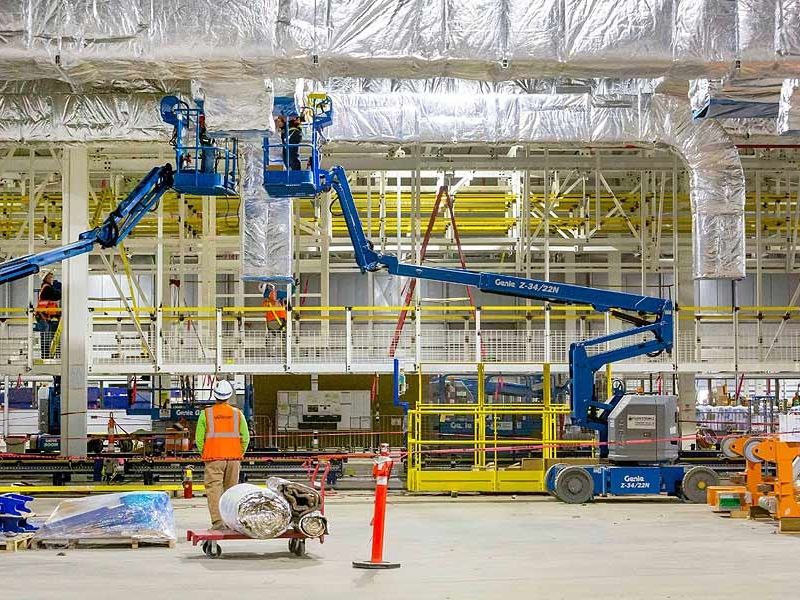
DETROIT — General Motors on Thursday said it is upping its spending on autonomous and electric vehicles by 35 percent to $27 billion and that 40 percent of its U.S. lineup will be electric by the end of 2025.
GM said it will move up the scheduled launches of some EVs and introduce at least 30 EVs globally through 2025, including 20 in North America.
“Climate change is real, and we want to be part of the solution by putting everyone in an electric vehicle,” CEO Mary Barra said in a statement. “We are transitioning to an all-electric portfolio from a position of strength and we’re focused on growth. We can accelerate our EV plans because we are rapidly building a competitive advantage in batteries, software, vehicle integration, manufacturing and customer experience.”
GM previously said it would spend $20 billion on EVs and autonomous technology by 2025 and have 20 EVs globally by 2023. More than half of the company’s capital and nearly 60 percent of its product development team will be dedicated to EV and AV programs, GM said.
GM also moved up the production timelines for the GMC Hummer EV, three other GMC EVs, four Chevrolet EVs and four Cadillacs. The Lyriq, Cadillac’s first full EV, will launch in the first quarter of 2022, nine months sooner than officials previously said.
It now plans to introduce a Chevy pickup 11 months sooner than planned, a Chevy compact crossover by 21 months and a second electric GMC pickup by 40 months.
Today, GM’s only EV in the U.S. is the Chevy Bolt. It plans to update the Bolt and start selling a crossover version of it next year.
GM appointed Travis Hester as chief EV officer, reporting to GM President Mark Reuss and Steve Carlisle, president of GM North America. Hester has been GM’s global vice president of customer experience since September 2019 and had been president of GM Canada since April 2018.
GM will launch a dedicated EV organization, led by Hester, called EV Growth Operations.
GM also will launch UltiFi, a customer experience program that combines the purchase, onboarding and ownership experience into one platform. It’s designed to simplify the shopping experience for EV buyers with clear pricing and online vehicle reservations, GM said.
The automaker is retooling its Detroit-Hamtramck Assembly plant, now called Factory Zero, to build at least five EVs by 2024, starting with the Hummer pickup in about a year.
GM last month said it would spend $2 billion to renovate its assembly plant in Spring Hill, Tenn., for EV production, starting with the Lyriq. Spring Hill will continue building the Cadillac XT5 and XT6, but as GM’s largest North American plant, it will need more EVs in the coming years to use its capacity efficiently. The plant could be making three electric Cadillacs by 2025, analysts say.
Analysts also expect GM to convert its plant in Ramos Arizpe, Mexico, for EV production.
The Hummer, which GM revealed last month, was developed in only 26 months. GM plans to adopt that quick development timeline as a standard across its portfolio.
GM also said the maximum range of its proprietary Ultium batteries has increased to 450 miles and that it would break ground on a battery innovation lab and manufacturing technology center for Ultium batteries next year.
Second-generation Ultium batteries, expected by mid-decade, will cost 60 percent less than today’s batteries, GM said, narrowing the cost gap between EVs and gasoline-powered vehicles.
Barra said GM is open to partnerships, such as the alliance with Honda Motor Co., that have the potential to validate and monetize the automaker’s technology investments. GM expects other companies — automotive and non-automotive — to be interested in licensing its Ultium battery technology, Barra said, but she did not provide an update on the automaker’s partnership with Nikola Corp.
A planned partnership between GM and electric truckmaker Nikola was delayed by allegations of fraud against Nikola. The deal had been scheduled to close at the end of September and would be canceled if not finalized by Dec. 3.
GM in September announced the partnership with Nikola. Under the proposed deal, GM would build Nikola’s electric Badger pickup with its proprietary Ultium batteries and provide fuel cells for the Badger and Nikola’s semitrucks. In exchange, GM would get an 11 percent stake in Nikola, a $700 million payment and electric vehicle credits.
A report from short seller Hindenburg Research followed the partnership announcement, accusing Nikola founder Trevor Milton of misleading investors about Nikola’s capabilities and products. The claims led to Milton’s resignation as executive chairman.
Nikola shares have been rising this week from about $20 to nearly $26 on Thursday.